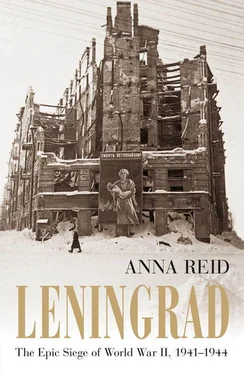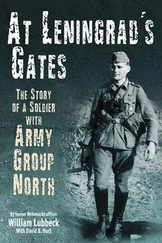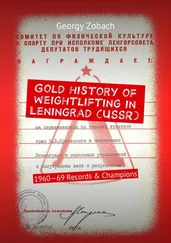3. ‘We’re Winning, but the Germans are Advancing’
Sovinform’s economy with the truth meant that Leningraders quickly learned not to trust official news sources. ‘ Nashi byut ’, they whispered to each other, ‘ a nemtsy berut ’—‘We’re winning, but the Germans are advancing’. They also learned to interpret vague Sovinform language. Ozhestochenniy boi (‘bitter fighting’); uporniy boi (‘determined fighting’); and tyazheliy boi (‘heavy fighting’) suggested increasing levels of seriousness. ‘Complex’ situations were grave ones, and the worst communiqué phrase of all—‘Heavy defensive battles against superior enemy forces’—meant full retreat. ‘From the veiled communiqués of the Soviet Information Bureau’, wrote one Leningrader, ‘it is nevertheless absolutely clear that the Red Army is unable to stop the German offensive on any one of the defence lines.’ {1} 1 Nikita Lomagin, Neizvestnaya blokada , vol. 2, doc. 30, p. 161; Alexander Werth, Russia at War, 1941–1945 , pp. 179, 241, 399; Leon Gouré, The Siege of Leningrad , pp. 68–70.
More reliable, though partial, were the kitchen-table confidences or overheard remarks of men newly returned from the front. In mid-August passionately anti-Bolshevik Lidiya Osipova, a pensioner living in Pushkin, thus discovered to her joy that the Germans were only fifty kilometres away: ‘Yesterday an airman, eating at the aerodrome cafeteria, said to the girl on the till, “Now we’re going to bomb the enemy in Siverskaya.” Hence we know that Siverskaya has been taken by the Germans. When are they going to get to us? And will they really come? The last hours before release from prison are the hardest.’ The so-called ‘reports’ by Party activists at her women’s organisation were useless, ‘like extracts from an illiterate wall newspaper… No commentary or questions are allowed. What we could have read for ourselves in fifteen minutes takes up a whole hour. Lord, when is all this going to end?’ {2} 2 Lidiya Osipova, 15 July and 13 August 1941, in Lomagin, Neizvestnaya blokada , vol. 2, pp. 442–3.
Guessing, though, was not the same as knowing, and hearsay filled the vacuum. Leningrad had not been bombed, it was rumoured, because Hitler was saving it as a present for his (mythical) daughter; alternatively, Vasilyevsky Island would be spared because Alfred Rosenberg (chief of Hitler’s Ostministerium ) had been born there. A Red Fleet ship had been scuttled in the middle of the channel out to the Baltic; the Wehrmacht had a circular tank that spat out shells like a Devil’s Wheel; and a German paratrooper had landed in the Tavrichesky flowerbeds, where he was lucky not to have been killed by old ladies armed with gardening forks. {3} 3 Georgi Knyazev, in Ales Adamovich and Daniil Granin, A Book of the Blockade , p. 261; Andrei Dzeniskevich, ‘The Social and Political Situation in Leningrad in the First Months of the German Invasion: The Psychology of the Workers’, in Robert Thurston and Bernd Bonwetsch, eds, The People’s War: Responses to World War II in the Soviet Union , p. 73; Igor Kruglyakov, interviewed by Dr Lyuba Vinogradova, Moscow, January 2007. Notes to Pages 52–64.
The authorities tried to halt the rumour mill. The city soviet’s executive committee forbade its employees from discussing the war on the telephone, on pain of prosecution for ‘disclosing military secrets’, and yet more ‘defeatists’ were arrested in accordance with a new law making those accused of spreading ‘false rumours provoking unrest amongst the population’ liable to trial by military tribunal. {4} 4 Irina Reznikova (Flige), ‘Repressii v period blokady Leningrada’, Vestnik ‘Memoriala’ 4/5 (10/11), p. 96; Gouré, The Siege of Leningrad , p. 71.
At the same time, the leadership indulged in some rumour-mongering of its own, diverting attention from disasters at the front by whipping up fear of spies, saboteurs and raketniki —‘rocket-men’—who were supposed to be using flares to signal to enemy aviation. Guidebooks and maps had to be handed in to a special department, as did bicycles, cameras and wireless radios. Tram and trolley-car conductors stopped calling out stops, street signs were painted over, and name boards removed from outside prominent buildings. It became hazardous to ask for directions or to appear in public in foreign-looking clothing. Dmitri Likhachev found himself trailed by small boys by reason of his pale grey coat (‘light-coloured clothes’, he remembered, ‘were not usual in the USSR’) and Yelena Skryabina, having left her tall, bespectacled son Dima outside a shop for a moment, returned to find him being questioned by a policeman. She was able to persuade him of Dima’s identity only by producing her husband’s military certificate, and by pointing out that since Dima was not yet sixteen he couldn’t possibly have a passport. {5} 5 Dmitri Likhachev, Reflections on the Russian Soul: A Memoir , p. 222; Yelena Skrjabina, Siege and Survival: The Odyssey of a Leningrader , p. 21. See also Dmitri Lazarev, in Trudy Gosudarstvennogo Muzeya Istorii Sankt-Peterburga , vol. 5, p. 195.
Another diarist, Yelena Kochina, found that she herself was not immune from the spy mania, which spread like ‘an infectious disease’:
Yesterday near the market a little old woman who looked like a flounder dressed in a mackintosh grabbed me:
‘Did you see? A spy for sure!’ she shouted, waving her short little arm after some man.
‘What?’
‘His trousers and jacket were different colours.’
I couldn’t help but laugh.
‘And his moustache looked as though it was stuck on.’ Her close-set angry eyes bored into me.
‘Excuse me…’ I tore myself away. Before pushing off, she trailed me for several steps along the pavement.
But… even to me many people seem suspicious, types it would be worth keeping an eye on. {6} 6 Yelena Kochina, Blockade Diary , p. 33 (June 1941).
Though the mania continued well into the autumn, and the stories of raketniki seem to have been believed even by shrewd observers—like, for example, the Anglo-Russian BBC correspondent Alexander Werth—there is not a single reliable instance of a genuine foreign spy (as opposed to local sympathiser) ever having been discovered in the city.
Four weeks into the invasion the mood in Leningrad was one of disoriented anticipation, of disconnect between near-normality on the streets and the stunning news on the radio. ‘It’s just impossible to believe there’s a war on’, wrote the crippled archivist Georgi Knyazev. ‘Everything’s so calm, if only outwardly.’ The weather continued hot and still, the fluff-covered poplar seeds Russians call pukh drifted along the gutters, and after work office clerks gathered as usual in Rumyantsev Square to play dominoes. Sitting out an air-raid drill in front of the Academicians’ Building one evening, Knyazev watched a team of teenage girls shovelling a pile of sand into a lorry, while small boys in swimming trunks dived into the river off the glossy stone backs of the Luxor sphinxes. An Academician’s wife stood guard duty wearing gloves and a hat. Chatting to the building’s caretaker, Knyazev tried to introduce a ‘mood of cheerfulness and perseverance’, but the man didn’t understand why the war wasn’t working out the way it had in the films. ‘“It’s awful”, he said, “that the fighting is happening on our territory. There’s so much destruction. Why did we surrender the old border defences just like that?” There was nothing I could say in reply. We have very little information. I still don’t know how near, or how far, the Germans are from us. Is Leningrad seriously under threat or not?’ The air, he noticed, carried a faint smell of smoke, from peat bogs deliberately set on fire so as to confuse enemy aviation. {7} 7 Georgi Knyazev, 20 July 1941, in Adamovich and Granin, A Book of the Blockade , p. 256.
Читать дальше











